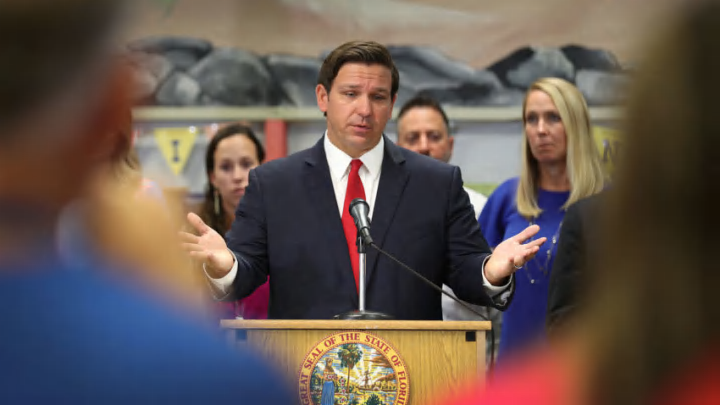Florida Gov. Ron DeSantis said Thursday he would support a measure to allow college athletes to make money off endorsements. Much to the chagrin of the NCAA.
On Thursday, Florida Gov. Ron DeSantis said he would support a bill allowing college athletes in the state to earn money from endorsements and use of their name, likeness or image — bucking the NCAA, who opposes any such measure.
A bill introduced in the Florida House would allow just that.
The bill, filed by Florida House Democrat Leader Kionne McGhee of Miami, mirrors a bill passed and signed into law in California. A similar bill was filed by State Rep. Chip LaMarca, a Republican from Lighthouse Point.
The NCAA has taken issue with the law by going so far as to threaten to ban California schools from post-season play because of the law.
But, now that Florida has entered the fray, we have a different situation on our hands.
By the Florida Legislature taking up the measure and the governor effectively saying he supports it, allowing players to earn money based on their likeness and even allowing them to hire agents licensed by the state (as would be allowable in Florida, if the bill passes), the issue of paying college athletes has stopped becoming a political issue.
DeSantis announces he endorses Florida bills filed to allow college athletes to make money pic.twitter.com/2M5RSZHEGC
— Emily L. Mahoney (@mahoneysthename) October 24, 2019
As McGhee said to the Orlando Sentinel when he filed the bill, it is now an issue of fairness.
We all know that college football earns the NCAA and its member schools billions every year. From lucrative television packages to basically producing a product with labor you don’t have to pay, college football is a virtual cash cow.
I understand the argument is that college athletes aren’t paid, but they do go to school and get room and board for free — which is something most average college students can’t say.
More from Hail Florida Hail
- Florida football: Billy Napier disappointed in how Gators’ handling success
- Florida football: Gators’ defense ranks No. 2 in the country in vital stat
- Florida Football: Former target Cormani McClain struggling at Colorado
- Florida Football: The curious case of Kamari Wilson
- Florida Football: Gators know consistency is the next big step
I won’t debate that notion right now. Something for a later time. But one thing to put in perspective is that neither the California bill nor those in Florida allow for the colleges themselves to pay players, only that the players can keep money from the use of their likeness.
If a tennis player at the University of Florida wants to create a YouTube channel and keep money from advertisements, they can. Now, they can’t, but the average college student doing the same thing can keep that money.
What I will suggest is that, if Florida does move ahead, the NCAA will be forced to take notice and, as DeSantis said “reevaluate” things.
You have to really ask yourself: Will the NCAA risk losing millions and millions of dollars by not allowing California schools into postseason play? Are they really going to cut out lucrative television markets like Los Angeles, San Francisco and San Diego?
Because that would be exactly what happens if they were to ban all California schools from playing in the postseason.
Imagine that happening in Florida.
No bowl games for Florida schools and there’s likely no bowl games actually played in Florida, which eliminates about half of them.
There’s no way the NCAA let’s that much money go out the door.
The House bill won’t be taken up by the Florida Legislature until the 2020 session, but other states could start looking at similar measures in the immediate future.
But, by Florida joining California, an opening salvo on player compensation has been shot across the NCAA’s proverbial bow.
